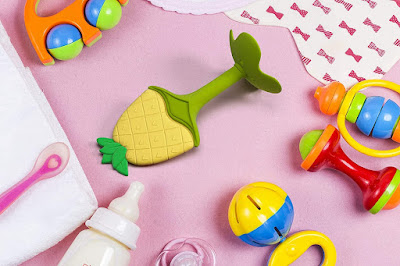What Are Teething Symptoms?
There is a good chance that your bathroom cabinet is stocked with a wide variety of baby wellness products so that you can quickly attend to symptoms or issues as soon as they arise. To prepare for teething, it is a good idea to be able to recognize the symptoms so you can take prompt action at the first signs.
The first thing to understand is where and when the first teeth come in. The first teeth to appear are typically the bottom two front teeth, followed by the top two front teeth. This usually occurs between four and seven months, but it varies from one baby to another. Babies typically have a full set of teeth - 20 in total - by the age of 3.
 |
| Photo credit: Babycare Journals. |
The most common symptoms and signs of emerging teeth include:
- Tender or sore gums
- Excessive drooling, which may result in a rash
- Crankiness and fussiness
- Chewing on a wide variety of objects
- Small increase in temperature
- Pulling their ear
- Rubbing their cheek
- Changes in sleeping or eating habits
Although it is not fun as a parent to watch your baby in discomfort, know that it will not last for too long.
Easing Baby's Teething Pain
While your baby is dealing with teething discomfort, there are things you can do to ease the symptoms. There are numerous teething crackers available that are hard and give your baby something to chew on. Make sure they are unsweetened, however.
Cold tends to help minimize discomfort and swelling. You can wet a washcloth with cold water or put a pacifier in the fridge for a little bit. There are also teething rings and toys you can place in the fridge. You can also place them in the freezer for a quick cool down, but do not freeze them completely. Make sure to choose ones made with non-toxic ingredients.
Applying a pressure against the gums helps minimize pain and discomfort, which is why teething toys help. You can also massage the gums with your finger, which your baby may also choose to chew on.
Although there are over the counter teething medication, you should avoid these. Some of them contain benzocaine, which should not be given to children under 2. Plus, they have not been shown to be effective. Instead, try something natural such as Wellements teething oil. It is made with organic ingredients and is free from allergens and preservatives, which helps soothe your baby's gums, and you can feel confident in the quality of the product.



